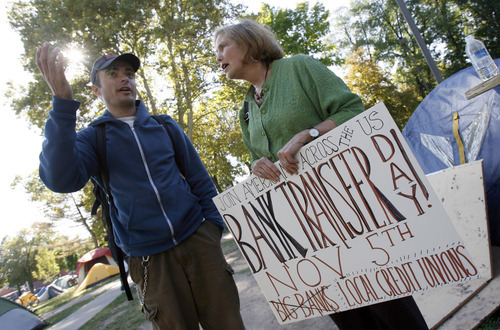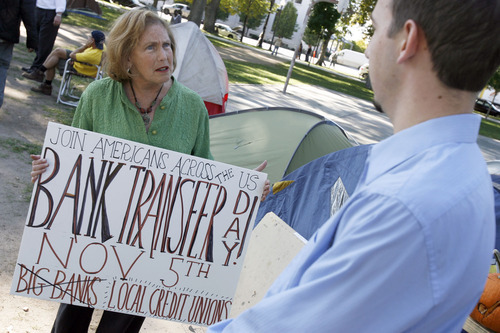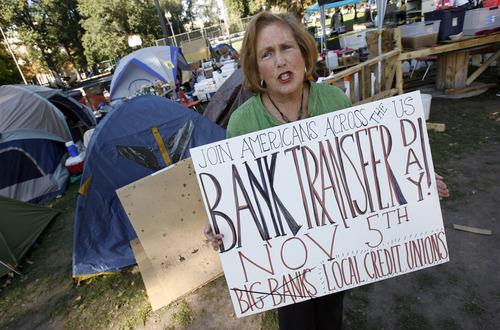This is an archived article that was published on sltrib.com in 2011, and information in the article may be outdated. It is provided only for personal research purposes and may not be reprinted.
Public anger that sparked the Occupy Wall Street protest is spilling over into direct action against Utah and U.S. banks, especially ones that took federal bailout money and charge high bank fees to make up for lost income while cutting back on lending and paying big bonuses.
The fury is showing up in calls for customers to move their deposits to other banks or credit unions as a way to strike back at financial institutions that activists say have too much power in Washington. The latest movement wasn't dreamed up by demonstrators in New York's Zuccotti Park or Pioneer Park in Salt Lake City. But they support it.
"This is the first clear action that people can take to show banks how unacceptable their behavior has been," said Elise Lazar, a Salt Lake City artist who is closing her accounts at Wells Fargo Bank and moving to University Credit Union.
"We know that the banks have had unbridled greed. Even with the bailout, instead of doing what was expected, and that is [loan] the money to small businesses and help out the who are losing their homes ... many of the big banks took the money and used it to seek out banks that were weaker and purchase them and to give themselves bonuses," Lazar said.
Banks are fighting back with assertions that the ire of activists is misplaced. Their anger should be directed at Congress, said Howard Headlee, president of the Utah Bankers Association.
Headlee said lawmakers touched off the latest hostilities when they capped the amount banks can charge merchants for debit card usage at about 24 cents per transaction, down from an average of 44 cents. The result was predictable. Two days before the rule went into effect on Oct. 1, Bank of America announced it would begin charging debit card users $5 a month next year when they make purchases with their cards.
"The policy that [activists] are upset about was adopted by Congress without any committee hearings, without any debate in the House of Representatives, and we clearly indicated that this would be the outcome. Congress knew what it was doing. For people to be upset with the banking industry is irrational and it encourages more bad behavior by Congress," Headlee said.
That said, the call to move deposits to more consumer-friendly institutions is being noticed. As of Wednesday, nearly 56,000 visitors to a Facebook page set up by Kristen Christian, a small business owner in California, said they would participate in Bank Transfer Day, set for Nov. 5.
In Utah, credit unions are reporting a steady stream of membership applications from people dissatisfied with banks and their fees, said Scott Simpson, CEO of the Utah League of Credit Unions.
"I have from our second-largest credit union [Mountain America] that last month was the largest net increase of membership applications in their history," Simpson said. "They are tracking this month to exceed that."
Danna Smith, manager of Mountain America's metro branch in downtown Salt Lake City, saw an obvious increase in people asking questions about memberships and credit union services, beginning in August.
"In July we opened around 104 [new accounts]. In August, 117, and that's just my branch. I don't know yet on September, but it's definitely on the upswing," Smith said. "I think the reason is a lot of the new fees that [banks] have started putting on to their customers."
Lazar belies the stereotype of the demonstrators who appear on televisions. More than 60 years old, she looks more like a doting grandmother than like zealot. She isn't trying to upend capitalism, though her motive for supporting Bank Transfer Day is philosophical. She believes small commerce is better for people than corporatism.
"Credit unions are local," she said.
It is the sense that decisions about the general direction of the economy increasingly are out of the control of individuals and small business that motivated Ashley Anderson to pledge to move his money from Zions Bank to a credit union.
"The influence that banks have on our ability to govern ourselves is a central problem. One easy way to address that is to shift money to more democratically owned institutions," said the 32-year-old director of Peaceful Uprising, a Salt Lake City nonprofit collective of climate-change and health care activists.
Although Anderson is ditching Zions Bank for a credit union, Dale Gibson, a 59-year-old direct-sales company executive, is leaving Wells Fargo for Zions.
After " 38 years [with Wells Fargo], countless personal loans, mortgages and business loans ... I am now faced with their billions in profits on a quarterly basis and the fact that they have now eliminated the free checking account I've had unless I have direct-deposit, which must equal at least $500 per month or it does not count, or place $1,500 to sit at 0.01 percent interest to eliminate the fee," said Gibson, who lives in Lehi.
"I am trembling with emotion."
Gibson travels frequently. He has stayed with Wells Fargo since 1973 because of its ATMs are widely available. But now he may have to pay a monthly fee to Wells Fargo, which is experimenting in five states (not including Utah) with a $3 usage fee.
"The loyalty factor is gone," Gibson said.
On Monday, Wells Fargo said its income from fees and charges plunged 7 percent in the third quarter, largely because of regulations that went into effect last year that limit overdraft fees and make it harder to raise interest rates on credit cards. Three days earlier, the bank began its debit card fee experiment.
"Things do change. Who would have thought that people would be paying for their television service?" Wells Fargo spokesman Mark Chapman said, referring to the free TV signals Americans enjoyed before the advent of cable.
Chapman frames the debit card fee in terms of convenience and value. If a Wells Fargo customer travels, he or she has access to 12,000 ATMs and 9,000 bank locations.
"That's one thing people should consider," he said. "If they use an out-of-network ATM, it is very likely that they will be spending more than $3."
Charles Liu, 32, a business analyst in Salt Lake City, is moving his money from JP Morgan Chase to another financial institution. Liu used to be a customer and shareholder of Washington Mutual until the bank collapsed in September 2008. Most of its assets were bought by Chase. Shareholders such as Liu lost everything.
"Right now most of the financial institutions [in the U.S.] are benefitting the community at large. None of the major banks are lending money despite being bailed out by taxpayer money," he said. "Banks are still doing the same things that they were doing prior to the crash. They are still doing very risky trades and things like that."
MaryJane Rogers, a Chase spokesman, said the bank is financially healthy and provides value to its customers.
"People are entitled to their opinions, but we stand on our record," Rogers said.
pbeebe@sltrib.comTwitter: @SLTribPaul —
Taking action
Nearly 56,000 people have visited a Facebook page at http://www.facebook.com/Nov.Fifth and said they will participate in Bank Transfer Day on Nov. 5 by moving their deposits.







